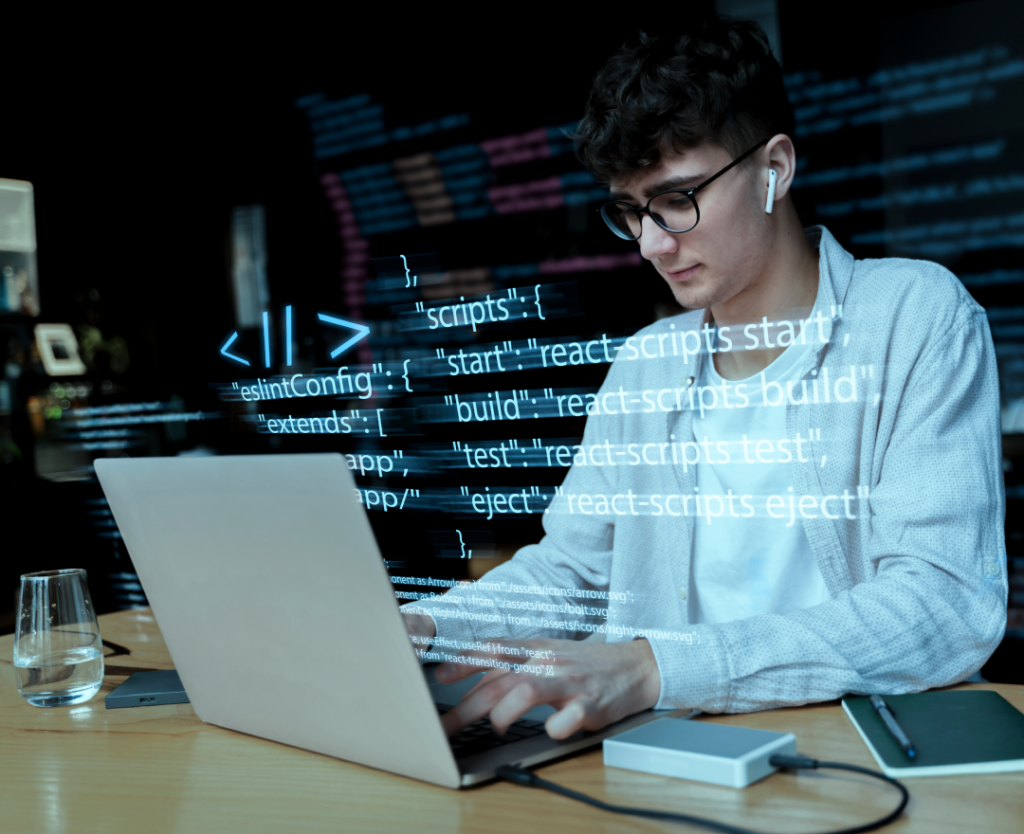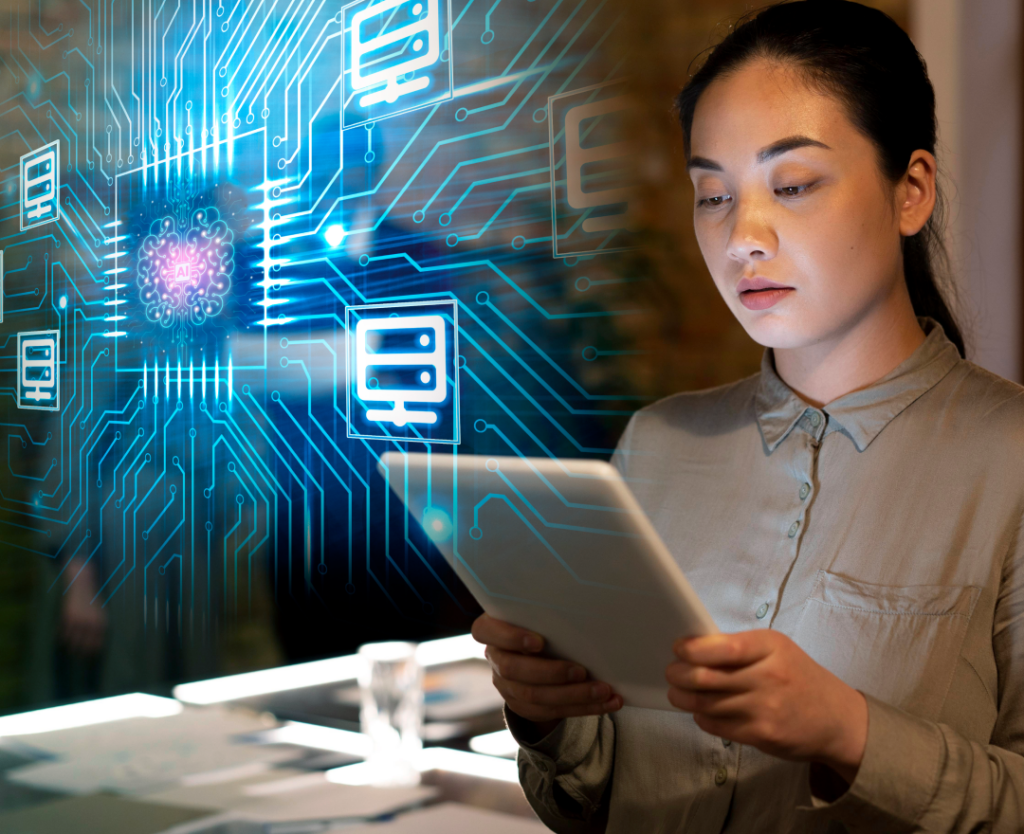Artificial intelligence is no longer merely an emerging trend in software development; it has become a crucial component of the process. Rather than replacing developers, AI is evolving into a powerful collaborator, boosting productivity, streamlining workflows, and driving innovation.
From intelligent code suggestions to automated debugging and optimized DevOps, AI is reshaping how software is built, tested, and deployed. Developers now have access to tools that help them write cleaner code, automate repetitive tasks, and manage complex projects more efficiently. Instead of taking away from human expertise, it amplifies it, allowing developers to focus on creative problem-solving, architecture design, and strategic decision-making.
AI-Powered Code Generation And Auto-Completion
One of AI’s most visible contributions to software development is its ability to assist with code generation and auto-completion. Tools like GitHub Copilot and Tabnine analyze vast amounts of open-source code to suggest context-aware snippets in real time. This dramatically reduces the need for developers to write boilerplate code, freeing them up to focus on solving complex problems.
But AI-driven coding isn’t just about speed. These tools help enforce coding best practices, reduce syntax errors, and enable teams to maintain consistency across large projects. For junior developers, these tools serve as on-the-fly mentors, offering guidance on optimal coding patterns. For experienced engineers, AI can expedite routine tasks, freeing up time for higher-level architectural work.
However, AI-generated code isn’t infallible. Developers must review suggestions carefully, ensuring that code remains secure, efficient, and aligned with project-specific needs. While AI speeds up the process, human oversight remains essential to maintain quality and integrity.
AI In Software Testing And Debugging
Software testing and debugging are traditionally time-consuming but critical phases in development. AI is significantly improving efficiency in these areas by automating test case generation, detecting anomalies, and even suggesting fixes in real-time.
By analyzing patterns across massive codebases, AI can identify patterns associated with common failures, proactively flagging potential issues before they become critical. Automated unit testing frameworks powered by AI reduce the manual effort required for regression testing, ensuring that software updates do not introduce new bugs, and helping teams maintain high-quality software with less effort.
Tools like Katalon and LambdaTest leverage AI to enhance automated testing. Katalon simplifies test automation for web, API, mobile, and desktop applications, using AI-driven analytics to optimize test coverage and detect flaky tests. LambdaTest, on the other hand, provides AI-powered cross-browser testing, allowing developers to run tests on multiple devices and browsers simultaneously, ensuring compatibility and performance across different environments.
Beyond efficiency, AI’s impact on debugging is game-changing. Traditional debugging often involves hours of manual code inspection. AI-powered debuggers can analyze runtime behavior, detect irregularities, and pinpoint problematic sections of code in seconds. This not only speeds up resolution times but also improves overall software reliability and security.
As AI-driven testing tools evolve, developers must remain vigilant about potential blind spots. AI can identify many issues, but nuanced problems, such as logic flaws or ethical concerns in algorithmic decision-making, still require human judgment. The ideal approach combines AI-powered automation with human expertise, ensuring robust and ethically sound software development.


AI-Driven Project Management And DevOps
Beyond coding, AI is transforming how software projects are managed and deployed. In project management, AI-driven analytics help teams predict potential bottlenecks, optimize resource allocation, and improve collaboration. For instance, Monday.com uses AI to automate workflows and predict project risks, while Asana leverages AI to enhance collaboration and forecast project timelines based on historical data. These tools provide insights into estimated completion times, workload distribution, and risk assessment, enabling leaders to make more informed decisions.
In DevOps, AI plays a key role in optimizing CI/CD (Continuous Integration and Continuous Deployment) pipelines. Dynatrace helps teams monitor and detect anomalies in real time, catching deployment failures early and reducing downtime. AI-powered tools like GitHub Copilot assist developers by auto-generating code and identifying potential issues early in the deployment process. Additionally, Puppet streamlines infrastructure provisioning and security compliance, making DevOps workflows more efficient and resilient.
By reducing human intervention in repetitive operational tasks, AI allows DevOps teams to focus on strategic improvements rather than firefighting unexpected issues. However, balancing automation with manual oversight is key. Misconfigurations or over-reliance on AI-driven decisions can introduce new risks if not carefully managed.
Challenges And Ethical Considerations
While AI offers immense benefits, integrating it into software development comes with challenges. One major concern is the ethical implications of AI-generated code. Bias in training data can lead to biased algorithms, security vulnerabilities, or non-compliant code. Organizations must implement strict validation processes to ensure that AI-assisted development aligns with industry standards and regulations.
Another challenge is the risk of over-reliance on AI. Developers who become too dependent on AI-generated suggestions may experience skill degradation over time. Critical thinking, problem-solving, and debugging skills remain essential, even in an AI-assisted environment. To mitigate this, AI should be viewed as an augmentation tool rather than a replacement for deep technical expertise.
Data privacy is another pressing issue. AI tools that analyze proprietary code or sensitive project data must adhere to strict security measures to prevent leaks or unauthorized access. Organizations must assess AI vendors carefully and implement safeguards to protect intellectual property.
The Future Of AI In Software Development
As AI continues to evolve, its role in software development will expand further. Emerging trends include:
- AI-driven cybersecurity solutions: AI will play a greater role in identifying vulnerabilities and preventing cyber threats before they happen.
- Low-code and no-code platforms: AI-powered development tools will make software creation more accessible, allowing non-technical users to build functional applications with minimal coding.
- Autonomous debugging and self-healing systems: AI may advance to the point where it autonomously detects and corrects issues in live applications, reducing maintenance costs and downtime.
Despite how sophisticated AI becomes, human creativity and problem-solving will remain at the heart of software development. The future is not about AI replacing developers but about AI empowering them to build faster, smarter, and more resilient solutions.
Conclusion
AI is fundamentally reshaping software development, acting as a force multiplier rather than a replacement for human ingenuity. From accelerating coding workflows to optimizing DevOps and project management, AI is enabling developers to work more efficiently and build higher-quality software.
Yet, AI’s integration into development also raises important questions about ethics, security, and long-term skill retention. The most successful teams will be those that strike a balance, which means leveraging AI’s strengths while maintaining the critical thinking and oversight that only humans can provide.
The software development landscape is shifting, and AI is at the center of this transformation. The companies and developers who embrace AI responsibly will be the ones shaping the future of technology.
